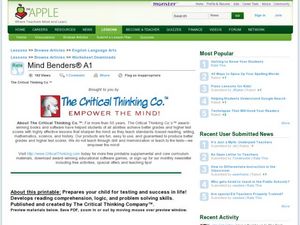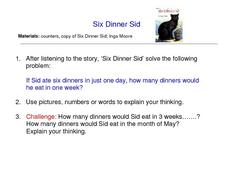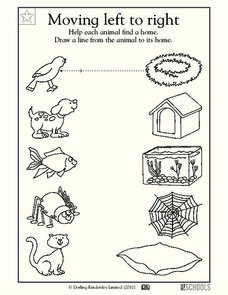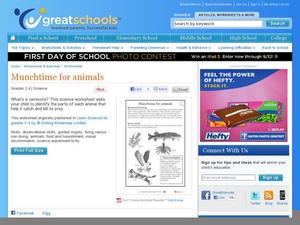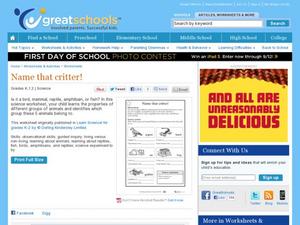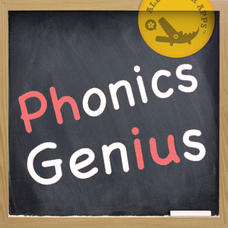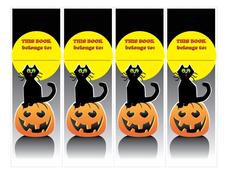Curated OER
Compare and Contrast
Practice comparing and contrasting with this straightforward worksheet. Young writers compose several different compare and contrast paragraphs about several topics (transportation, sports, relatives, subject areas, a dog and cat). The...
Curated OER
Maryland Vocabulary
After selecting State Unit Studies and clicking on Maryland, you'll be directed to a page with several useful links! You'll get basic state facts, a map of the state, and information on the flower, capital, flag, bird, dog, cat, etc! So...
Curated OER
Mind Benders: Name the Animals
In this deductive reasoning learning exercise, students read the clues about a cat, a small do, a goat, and a horse and identify them. Students solve 3 answers.
Curated OER
Phonics Train: /at/ words
A well-scaffolded phonics resource awaits you and your autistic learners. Phase one in this multi-page document asks, "What is on the train?" The answer is an /at/ word, such as cat, mat, bat, or hat. In Phase two, the train is shown...
Curated OER
Combinations to 20
Ten frames are a great way to help visualize simple math problems, evidenced in this clear and concise word problems worksheet. Each question features two ten frames for learners to use as they solve. All numbers are 20 or less....
Curated OER
Word Problems Using Six Dinner Sid
Sid the cat can eat six dinners in one day! After reading the short story Six Dinner Sid, learners respond to two multiplication word problems. First, they consider how many dinners Sid would eat in one week at his current rate. Then,...
Curated OER
How Many?
Working with numbers 1-10, beginning counters complete five exercises to help them hone their skills. They examine two sets of sports balls, circling the ones at various number positions. Next, they count a set of ladybugs, recording the...
Curated OER
Write the Word
Combine printing practice, shape recognition, and the color red with your kindergartners. They start by tracing the word red and writing it once or twice on their own. Then, they examine an image of flowers and color all the triangles...
Curated OER
Moving Left to Right
These animals need to find their homes! Young scholars help them by drawing lines from each animal on the left to its habitat on the right. There is no guessing to be done here, though; pairs are directly across from one another. They...
Curated OER
What's in Front?
Front and back are common prepositions. Early readers will practice understanding relative positions while using common prepositions by placing a check next to objects in front. Then they draw a cat in front of the house. Tip: Discuss...
Curated OER
Behind
Where is the mouse? Young learners look at eight images featuring a mouse and another object, determining his relative location. Is he behind the object? If he is, they put a check mark in the box. If not, they leave it blank. Encourage...
Curated OER
Interpreting Circle Graphs
What does this pie chart mean? Once scholars can analyze a circle graph on a basic level (i.e. "Most people prefer cats"), it's time to delve deeper into it. They examine two graphs here, and are given the total number of participants...
Curated OER
Munchtime for animals
Which animals eat meat to stay alive? Third graders group fish, hawks, and cats into carnivores and herbivores. An extended activity prompts kids to cut out magazine pictures of different animals according to the foods that they eat.
Curated OER
Name That Critter
Young learners classify five different animals into their proper category. The animals pictured are a pigeon, a lizard, a cat, a frog, and a goldfish. Pupils are also asked to tell why they know it's a certain kind of animal. An...
Curated OER
¡No robes los peces!
Your beginning Spanish speakers read the short reading passage about a girl, her cat, and a fish. After reading, have them answer the three multiple choice questions and the one short answer question provided. The answers are on the...
BW Walch
“Outsider” Poet Kay Ryan Goes from Poetry Club Reject to Poet Laureate
The cat might have got your tongue, but you can’t avoid the elephant in the room while you wait for the other shoe to drop. After all, the early bird gets the worm and the chickens are circling. After researching Poet Laureate Kay Ryan...
Innovative Mobile Apps
Phonics Genius
Readers at any level who are practicing phonics will benefit from a highly customizable set of features designed for instruction and practice. The extensive library of phonemes and exemplar words covers sounds from the a in cat to the zh...
Perkins School for the Blind
Learning to Identify Sounds Made by the Body
Sneeze, snap, tap, and whistle; Did I do that? Explore the parts and sounds of the human body with your learners with visual impairments. First you'll name the parts of the body, make a sound with each part, and then have the class guess...
Education World
October Bookmark
Celebrate the arrival of Halloween with an adorable bookmark. Including a spooky illustration of a black cat and a pumpkin, the resource is a great way to get students excited about reading.
Positively Autism
"The Napping House" Vocabulary
House, sleeping, bed, granny, child, dog, cat, mouse, flea. Introduce these vocabulary words before a reading of The Napping House.
Willow Tree
Box-and-Whisker Plots
Whiskers are not just for cats! Pupils create box-and-whisker plots from given data sets. They analyze the data using the graphs as their guide.
National Park Service
Leave it to Beavers
Many people know cats mark their territories by rubbing the back of their necks to leave a scent, but not many people know beavers also leave a scent to mark their territories. During the first activity of two, scholars use their noses...
GeoGebra
All For One, One For All
Will someone please constrain those pets? Pupils create two constraint equations on the number of cats and dogs for a pet sitter. They choose specific points and determine whether the point satisfies one or both constraints. The...
GeoGebra
Pet Sitters Feasible Region
Find the best way to maximize the profit. Pupils graph four constraints of a pet-sitting company, using a revenue equation to find a maximum amount the sitters can earn. By using the equation, scholars determine the number of cats and...
Other popular searches
- Cat in the Hat
- The Cat in the Hat
- Poe the Black Cat
- Millions of Cats
- Cat on a Hot Tin Roof
- Dogs & Cats
- If You Give a Cat a Cupcake
- Dogs and Cats
- Cat Biology
- Big Cats
- Saber Tooth Cats
- Cats the Musical




